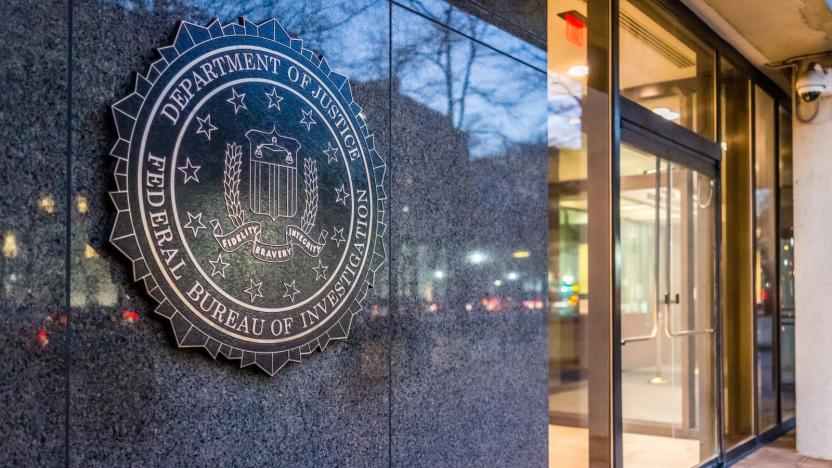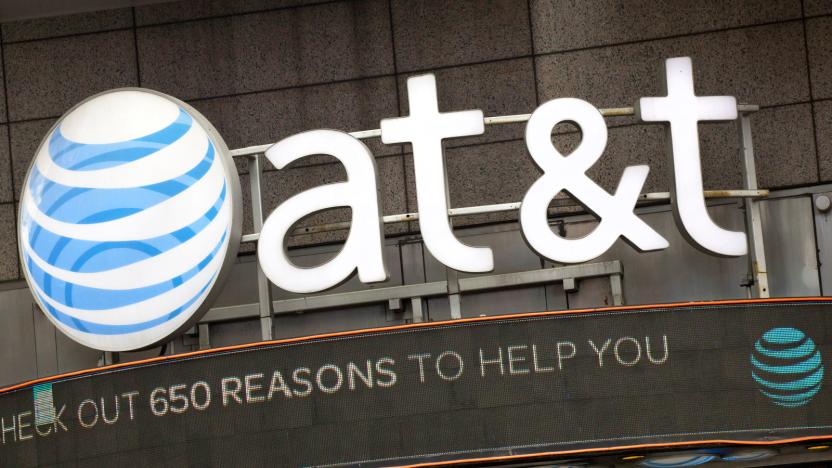PRISM
Latest

Yes, the Patriot Act amendment to track us online is real
Looks like more bad news with the renewal of the Patriot Act/USA Freedom Act — and its terrible provision to allow government collection of Americans’ internet browsing and search histories without a warrant.

Court says data swept up by the NSA is protected by the Fourth Amendment
An appeals court may have just shaped how the US treats the NSA's bulk data collection. The Second Circuit Court of Appeals has ruled that American communications scooped up under the Foreign Intelligence Surveillance Act's Section 702 and PRISM is protected by Fourth Amendment rights baring unreasonable searches and seizures. Judges found that the "vast majority" of the evidence collected in a terrorism case against Agron Hasbajrami was permissible under the Fourth Amendment, but that the querying that data "could violate" the amendment -- and thus that it was fair to challenge the data use on constitutional grounds. It also believed that the accidental collection of Americans' data raised "novel constitutional questions" that could be answered later.

FISA court: FBI use of NSA's electronic surveillance data was illegal
A US court ruled that some of the FBI's electronic surveillance activities violated the constitutional privacy rights of Americans. The Foreign Intelligence Surveillance Court (FISC) deemed that FBI officials improperly searched a National Security Agency (NSA) intelligence database for info on Americans. The ruling was made last year but just revealed by the intelligence community today.

Samsung's customizable refrigerator comes in nine colors and eight sizes
Samsung wants to capitalize on consumers who value personal tastes and experiences, and they plan to do so with refrigerators. Yesterday, Samsung revealed Project PRISM, or what it's calling a "new era of customized home appliances." The first product in its lineup is BESPOKE, a refrigerator for which users can choose the material, color and size, as well as other features.

Trump signs bill extending NSA's warrantless surveillance
On Friday afternoon, just hours before Congress failed to avert a government shutdown, the President signed into law the "FISA Amendments Reauthorization Act of 2017." The bill passed the House and Senate earlier this week with the support of many Republicans and Democrats, offering only slight adjustments to Section 702, a law that oversees the NSA's ability to spy on "international terrorists, weapons proliferators, and other important foreign intelligence targets located outside the United States."

Senators propose 'USA Liberty Act' to reauthorize NSA surveillance
The question of how to rein in monitoring enabled by Section 702 of the Foreign Intelligence Surveillance Act (FISA) has been in the spotlight ever since the Edward Snowden PRISM revelations. What exactly to do about it has gone back and forth, but the latest attempt to "reform" surveillance is here in the form of the USA Liberty Act, a bipartisan proposal introduced by Senators Mike Lee and Patrick Leahy (PDF). The Washington Post figures it has little chance of passage, however, it does contain language that would make government agencies get a warrant before searching information collected by the NSA under Section 702.

Just add an iPhone to experience AR with Mira's $99 headset
While mobile VR is a vibrant market these days, thanks to the Gear VR and Google's Daydream View, the same can't be said for AR. If you want to dabble in augmented reality, you'd better be prepared to shell out at least $950 on hardware like the Meta 2, and even more for a beefy PC to run it. Microsoft's HoloLens, which helped to popularize the dream of AR, still costs a whopping $3,000. But Mira, a young LA-based startup, is hoping to make things simpler with Prism, its $99 mobile headset. Just drop in an iPhone 7, and you too can view AR atop the real world.

Mystery internet company challenges NSA’s mass surveillance order
Thanks to a newly-declassified document, we know that an unnamed tech company refused to comply with NSA orders to let the agency spy on the company's client users. It's the first known case of an organization from the industry outright rejecting such a request.

Obama's legacy: The most tech-savvy president
When Barack Obama moved into the White House on January 20th, 2009, the federal government was in the digital dark ages. Even as late as 2011, he was complaining that the White House was 30 years behind. Among other things, Obama was the first president to carry a BlackBerry, and even so, it wasn't until 2016 that the leader of the free world was finally able to trade in his aging RIM device for a modern smartphone. And, as the president was quick to point out in an interview with Jimmy Fallon, the unnamed phone is so locked down, it's like one of those "play phones" you'd give to a 3-year-old. Despite these hurdles, Obama made it one of his priorities to modernize the federal government on everything from telecommunications policy to White House IT. He tackled infrastructure, STEM education, net neutrality and climate change in serious and substantive ways. Of course, the president's efforts weren't always a rousing success, and on issues involving privacy, spying and drone usage, he faces lingering criticism from both ends of the political spectrum. But, love him or hate him, for better or worse, when it comes to science and technology, Barack Obama has had a bigger impact than almost any president in history.

AT&T reportedly spies on its customers for government cash
AT&T controls a big chunk of America's cellular infrastructure, and it turns out that it's been using that power for super-creepy purposes. The Daily Beast is reporting that the telco has essentially turned itself into a spy-for-hire in the pay of the government. According to the piece, the company's Project Hemisphere is providing warrantless surveillance, thanks to some legal gray areas, that score it millions of dollars from taxpayers.

NYT: Yahoo reworked its malware scanner for email surveillance
Following a Reuters report that in 2015 Yahoo scanned customer emails for US surveillance, the New York Times has followed up with details from anonymous sources of its own. Although Yahoo responded a day later claiming the initial report was "misleading," the NYT sourced unnamed government officials claiming the company modified a system used to scan all incoming email for malware that stored matching messages and made them available to the FBI.

'Snowden' is a simplistic, but important, reminder of NSA spying
When Oliver Stone's Snowden was first announced, it seemed far too soon to be retelling the story of the infamous whistleblower. After all, it was only three years ago that the files Snowden leaked led to the world-shaking revelations of the NSA's massive global surveillance network. That's not nearly enough time for us to make any sort of substantive historical analysis.

Report reveals identity of NSA and PRISM surveillance target
It's been over three years since former NSA contractor Edward Snowden released a trove of documents detailing the extent to which the American government was able to spy on its citizens. A big part of those revelations was PRISM, a system that allowed the government to expediently request and collect data from a variety of huge internet companies including Facebook, Apple, Google, Microsoft and more. Today, a new report from The Intercept contains details on the first person to be identified as a target of PRISM.

The Intercept is opening up access to the Snowden archive
Nearly three years after Edward Snowden first exposed the NSA's PRISM electronic data mining program, and his trusted journalist partners are finally ready to bring even more of those documents out into the open. Today, The Intercept announced two initiatives to further that goal: First, the site is releasing a cache of internal NSA documents that it believes will point other journalists towards noteworthy stories. And second, The Intercept will partner with other national and international media outlets to allow access to the sensitive documents in its possession.

Edward Snowden is the Lavabit user the government was after
There was never hard proof that the government was after Edward Snowden during its pursuit of now-defunct secure email service Lavabit, but that's changed. In an embarrassing gaffe, the feds released unredacted court documents confirming the suspicion everyone had but no one could prove outright. Wired reports that Lavabit's former owner Ladar Levison has been threatened with contempt and possible jail time in the event of breaking his silence. It's a good thing he doesn't have to worry about that anymore, isn't it?

FBI confirms new rules for accessing Americans' NSA spying data
Score one for privacy... I guess? The FBI has confirmed to The Guardian that it's accepted new privacy rules for accessing data on American citizens collected by the NSA. The only rub? We don't know what the heck has been changed. In fact, the agency won't even say when the new rules took affect. All we know is that the government watchdog group PCLOB (the Privacy and Civil Liberties Oversight Group) noted the change in its most recent compliance report. Specifically, the group says the Obama administration has introduced "revised FBI minimization procedures" that take into account its earlier privacy concerns about how the agency accesses surveillance data.

White House refuses security clearance for Ashkan Soltani
Last month White House CTO Megan Smith announced that Ashkan Soltani would be joining her staff as a senior advisor, after leaving his post as the FTC's chief technologist. Today, Soltani revealed he will not be able to take the job, after being informed by the Office of Personnel Security that he is not receiving the necessary security clearance. There's no explanation as to why that is, but as The Guardian mentions and many are speculating, it could be a result of Soltani's participation in Pulitzer-winning reporting for the Washington Post covering the Edward Snowden revelations. We've contacted the White House and the Office of Science and Technology Policy but have not received any response.

NASA to study the health of coral reefs across the world
Coral reefs are breathtaking homes for a diverse range of marine life, including turtles, sharks and eels. They're under threat from pollution, fishing and climate change though, and the data available on their deteriorating health is scattershot. To help, NASA is launching the Coral Reef Airborne Laboratory (CORAL) project, which will survey entire reef systems in Florida, Hawaii, Palau, the Mariana Islands and Australia. Airborne measurements will be taken with a Portable Remote Imaging Spectrometer (PRISM), which records the spectra of light reflected upwards by the ocean, and specifically the different signatures created by coral and algae.

WSJ: China's government wants homegrown, backdoor-free phones
The Wall Street Journal is reporting that China's government has now leant on ZTE to produce a smartphone using predominantly local hardware that'll run COS, a homegrown operating system that's designed to be immune to US-based hacking attempts. The paper goes on to say that Alibaba is now working with the nation's ministry of public security to develop another operating system that's secure enough for police officers to use. It's all part of the country's attempts to put water between itself and the US in a post-Snowden world after backdoors were found in numerous American-designed products.

The NSA can keep spying on phone call metadata through November
The National Security Agency can keep on keeping on with the bulk collection of phone call metadata for a bit longer, sadly. The United States Court of Appeals for the District of Columbia killed an injunction that would've ended the previously-ruled-unconstitutional homegrown spying, according to The New York Times. The law won't fully end until November 29th, when the so-called transition period for the agency to swap over to a new style of data collection is over. The latest method? Telcos will hang onto the data and the government snoops will need court orders if they want to get their hands on it. We still have a ways to go before PRISM's effects are fully overturned, it'd seem.[Image credit: Shutterstock]










